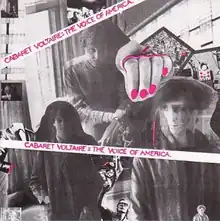| The Voice of America | ||||
|---|---|---|---|---|
 | ||||
| Studio album by | ||||
| Released | July 1980 | |||
| Recorded | March–April 1980 | |||
| Studio | Western Works, Sheffield, England | |||
| Genre | Industrial, experimental, post-punk | |||
| Label | Rough Trade[1] | |||
| Producer | Cabaret Voltaire | |||
| Cabaret Voltaire chronology | ||||
| ||||
The Voice of America is the second studio album by English band Cabaret Voltaire.[2] It was released in July 1980, through record label Rough Trade.
Critical reception
| Review scores | |
|---|---|
| Source | Rating |
| AllMusic | |
| The Encyclopedia of Popular Music | |
| MusicHound Rock: The Essential Album Guide | |
| The Rolling Stone Album Guide | |
| Select | 2/5[7] |
| Spin Alternative Record Guide | 8/10[8] |
Trouser Press wrote that "the new material shows much greater focus and cleaner production than the older, with the mantra technique rising in place of the former chaotic electro-noise."[9] AllMusic called it "not as spectacular as what would follow, but not without its own set of thrills."[3]
SF Weekly wrote that "the music keeps moving outward, emitting boomerang-like signals that are only coming back to us today: The Moog-y skronk of 'Partially Submerged', part Krautrock and part free-jazz, anticipates Cologne's unfettered improv glitches, Radiohead's sprawling rock, and Aphex Twin's Dramamine ambiance."[10]
Track listing
All tracks are written by Richard H. Kirk, Stephen Mallinder, Chris Watson
| No. | Title | Length |
|---|---|---|
| 1. | "The Voice of America/Damage Is Done" | 6:16 |
| 2. | "Partially Submerged" | 3:45 |
| 3. | "Kneel to the Boss" | 3:52 |
| 4. | "Premonition" | 5:03 |
| No. | Title | Length |
|---|---|---|
| 1. | "This Is Entertainment" | 5:51 |
| 2. | "If the Shadows Could March? (1974)" | 0:55 |
| 3. | "Stay Out of It" | 2:38 |
| 4. | "Obsession" | 5:06 |
| 5. | "News From Nowhere" | 2:21 |
| 6. | "Messages Received" | 3:16 |
Samples
"Stay Out Of It" samples three phrases from the Outer Limits episode "Demon with a Glass Hand": "the third part of your brain... you know where it is?", "don't kill me, please... please..." and "the hand... tell me what to do".
The opening of the album is taken from newsreel footage of policemen being given instructions how to cope with Beatles fans before a Beatles concert in 1966.
Personnel
- Cabaret Voltaire
- Richard H. Kirk – guitar, wind instruments
- Stephen Mallinder – vocals, bass guitar, electronic percussion
- Chris Watson – synthesizers, tapes
- Haydn Boyes Weston – drums
- Technical
- Cabaret Voltaire – recording, production
- Porky – mastering
Trivia
The run-out area etchings on side one include the question "WHERE IS THE THIRD MANTRA?" which is a reference to their earlier release Three Mantras.
References
- ↑ Young, Rob (19 March 2006). Rough Trade. Black Dog Publishing. ISBN 9781904772477 – via Google Books.
- ↑ "Cabaret Voltaire | Biography & History". AllMusic.
- 1 2 Kellman, Andy. "The Voice of America – Cabaret Voltaire : Songs, Reviews, Credits, Awards : AllMusic". AllMusic. Retrieved 23 February 2013.
- ↑ Larkin, Colin (2006). The Encyclopedia of Popular Music. Vol. 2. MUZE. p. 115.
- ↑ MusicHound Rock: The Essential Album Guide. Visible Ink Press. 1999. p. 187.
- ↑ The Rolling Stone Album Guide. Random House. 1992. p. 104.
- ↑ Finlay, Leo (July 1990). "Praying To Mecca". Select. p. 122.
- ↑ Spin Alternative Record Guide. Vintage Books. 1995. p. 67.
- ↑ Grant, Stephen; Sheridan, David. "trouserpress.com :: Cabaret Voltaire". trouserpress.com. Retrieved 23 February 2013.
- ↑ "Cabaret Voltaire". SF Weekly. 27 March 2002.
External links
- The Voice of America at Discogs (list of releases)